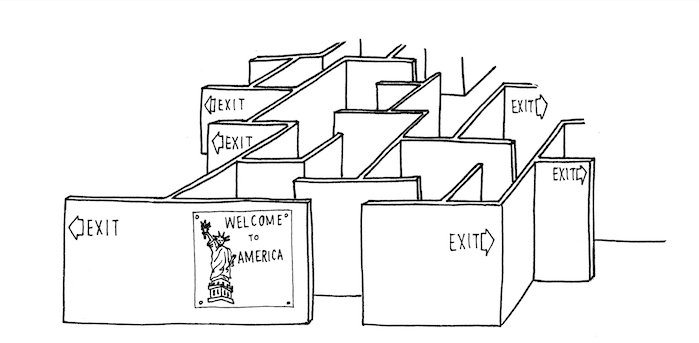Illustration by Maytal Bach
On January 25, the Trump administration proposed a compromise on immigration policy. This proposed deal preserves a version of DACA, but builds a wall on the US-Mexico border and heavily limits legal immigration to the US. While this plan has some flaws, it overall includes many necessary reforms.
The first part of the plan is an increase in border security. $25 billion would be spent building some form of a wall on the US-Mexico border. In addition, it would hire new immigration officials such as judges and attorneys.
Building a wall would not effectively reduce illegal immigration. Nearly half of illegal immigration to the United States comes from people overstaying visas, which would not be affected whatsoever by a border wall. Of those immigrants who do cross the border, a border wall would not stop them. When a partial border wall was constructed under the Secure Fence Act of 2006, illegal immigration was not significantly reduced. Immigrants found ways to get through. Even a perfectly secure, invulnerable fence would not stop illegal immigration. Immigrants could move to boat or air travel, which would bypass a border wall. Building a wall is a complete waste of $25 billion which could be better spent elsewhere.
Although a wall is unnecessary, equipping our justice system with the resources to do its job should be a no-brainer. Due to the currently overworked and underfunded immigration courts, it can take years for cases to be heard.
The proposal would also pass a version of DACA, which shields roughly 800,000 undocumented immigrants who came to the US as children from deportation. Again, this is a common sense good idea. These people had no choice in whether to come to the United States and are Americans in all but name, paying taxes and contributing to society.
Trump’s plan would also restrict family-based migration, which allows relatives of legal immigrants to be prioritized for green cards, to only spouses and children under eighteen. Currently, family-based migration allows adult children and siblings to be prioritized too. This would reduce immigration to the US by nearly 44 percent, according to the Cato Institute, a libertarian think tank. However, this aspect of the plan would negatively impact the economy. A survey conducted by the University of Chicago found a consensus among economists that immigration benefits the economy and such a massive reduction in immigration would undoubtedly be counterproductive.
Finally, the proposal would end the Diversity Visa Program, which grants visas on a lottery basis to people from countries with low levels of immigration to the United States and relocate those visas towards family-based and skill-based immigrants. There is no reason for immigrants from certain countries to be prioritized over equally deserving immigrants from other countries. Eliminating this program would go a long way towards making our immigration system more just.
The president’s plan, while imperfect, is the most likely chance our country has of seriously reforming the immigration system.


